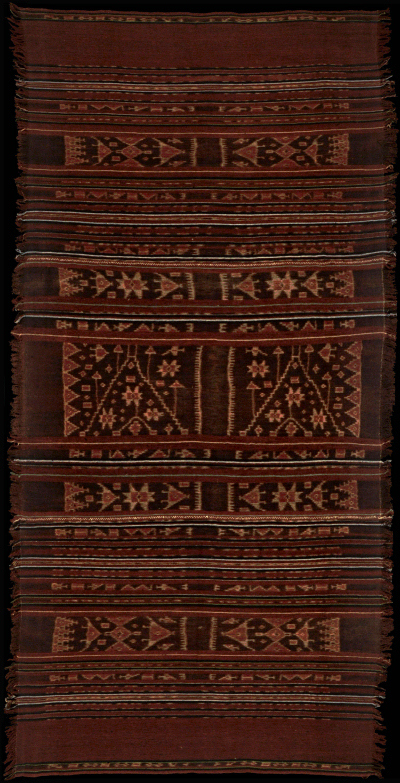| |
 
 | | | |
047 Solor Archipelago, Lembata
Kewatek (sarong)  
| | Locale: | Lamalera, whalers community. Lamaholot people. | | Period: | Early 20th c. | | Yarn: | Cotton, hand-spun, coarse | | Technique: | Warp ikat | | Panels: | 3 | | Size: | 113 x 240 cm (3' 8" x 7' 10") LW: 2.12 | | Weight: | 1200 g (42.3 oz), 442 g/m2 (1.45 oz/ft2) | | Design: | Kewatek nai telo, three panel sarong, decorated with a motif that by local weavers was identified as peledang, whalers' rowing/sailing prahus with long oars; smaller motifs represent eight-pointed stars, sirete, and sting rays, ikan pari. Most likely the identification as a whaler's prahu is a late interpretation. Boat motifs are wide-spread in the archipelago and are related to myths of origin involving immigration from overseas - which certainly was the case with the inhabitants of Lamalera, who are late arrivals on Lembata. Tumpal motifs on longitudinal border of the field. Executed in three shades of brownish red, with narrow bands in dark indigo, green, mauve. | | Comment: | An outstanding example of Lamalera ikat weaving. Unlike in most Lamalera cloths, motifs stand out well from background and weaving is relatively tight. Lembata cloth of this quality and age is quite rare. The main motif is similar to a motif found in Lio district of Ende, on sarongs of a type called lawo luka semba, see PC 099, heavily patola-influenced. Here the motif is known as keli mara, i.e. 'Mara Mountain'. Not clear is if depiction of a mountain is truly its original form. A simplified form occurs in the tumpal-like border of an early Ende semba, PC 239. The eight-pointed star is also occasionally used on Timor, and very common on Kisar, where it is nearly always boxed into a square or rectangle. | | Background: | Chapters on Solor Archipelago and Lembata. | | Published: | Ikat Textiles of the Indonesian Archipelago, 2018.
| | Compare: | 048 115 131 119 126 | | Sources: | Khan Majlis, Indonesische Textilien, Wege zu Goettern und Ahnen, p.92. | | |

©Peter ten Hoopen, 2025
All rights reserved.
|
|


